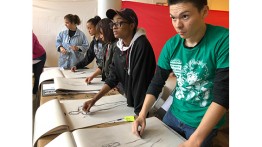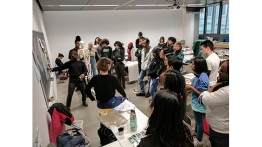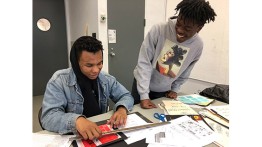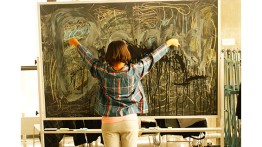Saturday Program Turns 50!
POSTED ON: November 29, 2018
A year of extraordinary upheaval and possibility, 1968 proved to be the starting point of many critical changes to education. There were the student strikes across Europe and Latin America; in New York a city-wide teacher’s strike closed schools for weeks in a struggle over community control of schools. It was also the year of important initiatives designed to create more equity in access to education when a group of New York State legislators, including Shirley Chisholm and Percy Sutton, demanded the formation of programs to expand minority access to CUNY and SUNY schools.
It was in that same spirit that a group of Cooper Union art and architecture students, seeking to level the college-entry playing field, founded the Saturday Program, known as SatPro. They wanted to share their top-flight education with high school students in public schools in New York who might never have had the chance to develop their art skills or consider going to college. The founding members visited high schools across the city to get the word out. “People were hungry for opportunity, so they came.” Marina Gutierrez, current co-director of the Saturday Program and alumna of Cooper, says.
And for the past 50 years, students have continued to come to the Saturday Program for opportunities that are increasingly hard to come by: the chance to work with other young hopeful artists and architects—all current students at The Cooper Union—who teach high schoolers drawing, sculpting, design, and painting skills. Attendees also glean information about applying to art school that the average guidance counselor wouldn’t have the time to source. The portfolio prep class is a case in point. A free, two-semester course, Portfolio Prep gives seniors from New York city public high schools the instruction, materials, and mentoring they need to develop competitive portfolios for college applications. At the same time, the class teaches students how to articulate their ideas so they can fully participate in a college atmosphere with confidence.
Dean of the School of Art, Mike Essl, commented on the great impact of the program: "Because of a small group of people’s dedication and belief in free education, the Saturday Program has brought art and architecture courses to generations of New York City high school students. The program demonstrated to those young artists that their voices counted and gave them the means to articulate their ideas. The program is needed now more than ever.”
Recognizing the course’s great value as a tool for improving art school admissions, several funders, including the New York State Council on the Arts and the Richard and Jean Coyne Foundation, donate specifically to support Portfolio Prep class. In 2013 Jeffrey Gural, a (now former) member of the Board of Trustees, pledged $1M over ten years to the program. Other major donors have noted that they support the Saturday Program because it so aligns with Peter Cooper’s goals in founding the institution that bears his name.
"Current Cooper Union students who teach the program’s courses reinforce their own skills and get valuable teaching experience while earning funds for their own educations," says Ms. Gutierrez. At the same time, the high school participants can choose from an array of courses designed to both help them expand their creative boundaries and definitions of what are is or can be. Sound Composition is a terrific case in point: the course teaches students to use sounds from non-musical sources as a resource for their art work. They learn ProTools, a software for audio editing, and after many explorations around the city to record all kinds of sounds—from footsteps to wind to subway chimes to the wheels on hand trucks—create musical pieces with all these excerpts. The course, which was designed by artist Charles Fambro, who is the program's curriculum coordinator, connects audio and visual by asking students to immerse themselves in a selection of sounds and make drawings that represent what they hear. Says Mr. Fambro, “In short, they are composing with the ears instead of the eyes. The students are encouraged to react intuitively to what they hear, over time developing a deft ear-to-hand coordination.”
In the next edition of At Cooper, we will celebrate the Saturday Program’s half-century anniversary by talking to one of its founders, Robert Van Nutt A'69 as well as students, alumni, and student teachers of SatPro to get a more detailed look at how this one small initiative has had a remarkably oversized impact on generations of young artists.









